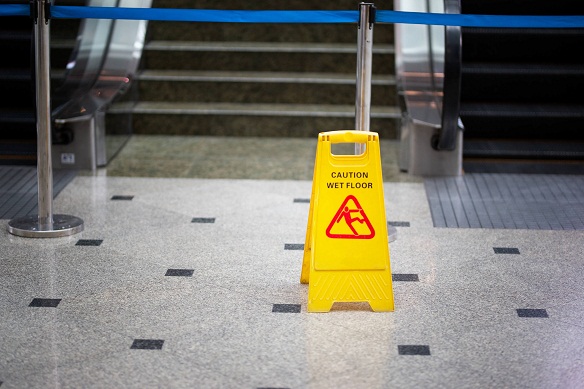Premises Liability: Your Fall Injury May Not Be Your Fault

A Possible Scenario
Say you need to do some grocery shopping to cook your family dinner, so you head to your local grocery store to pick up a few things. You’re pushing your cart down the frozen goods aisle, looking for the frozen peas you need, but unbeknownst to you, a piece of laminate tile in the floor has come loose. Your cart rolls over it, but your feet aren’t so fortunate — your toe snags on the uplifted tile, and down you tumble. You try to break your fall with your hands and hear a loud snap, then feel a searing pain in your wrist. To make matters worse, you hit your head on the side of your cart on your way down and feel an instant throbbing pain in your temple. A gash opens up and blood starts to pool.
An ambulance is called and you’re taken to the hospital. The doctor tells you your wrist is severely broken in multiple places and you’ll need surgery — more than one — to fix it. And to regain full use of your wrist, you’ll need months of physical therapy. When you hit your head, you also suffered a concussion. After a day or two, you start to experience frequent dizziness and disorientation because of it.
It’s a terrible situation. You’re missing work, medical bills are mounting, and you have a long road to recovery. All because of a loose tile at your favorite grocery store. It could have happened to anyone shopping in that aisle, but it happened to you, by no fault of your own.
So who can you hold responsible to compensate you for your lost wages, necessary health care, and pain and suffering?
Premises liability law may be able to show you.
Defining Premises Liability
When you go to the grocery store, take a walk around your neighborhood, or visit someone’s home, the last thing you expect is to be injured while on the premises. But accidents happen, and that’s why Florida law holds property owners liable when visitors to their property are injured. Premises liability claims are a type of personal injury claim, and under premises liability law, property owners have a duty to maintain safe conditions on their property.
Even though suffering a devastating fall on someone else’s property sounds like it should be an open-and-shut case in favor of the victim, there’s a burden of proof that needs to be executed to show that the property owner’s negligence caused bodily harm. To bring a successful claim in Florida, the law requires the plaintiff to prove four elements of negligent action:
- The property owner owed you a duty of care
- The proper owner breached that duty of care
- The breach caused you to suffer an injury
- Actual damages resulted to you
If you can prove each of these four necessary elements, you may have an excellent chance at receiving due compensation from the property owner or their insurance company.
Duty of Care
Under Florida law, property owners and managers do not actually owe everyone that comes onto their property the same duty of care. Instead, it’s first determined by the reason a person entered their property. People who enter a property are generally classified as either an invitee, licensee, or trespasser.
Invitees are those who enter another’s property for a legitimate business reason. In the case of shopping at a grocery store, patrons are considered invitees. Licensees are people who enter another person’s property with the permission of the owner for a specific social purpose, like house guests who enter someone’s home for a gathering. Trespassers, on the other hand, are people who enter another’s property without permission to do so.
According to state law, invitees are owed the highest duty of care by property owners. Specifically, owners must keep their premises safe by regularly inspecting the property and either repairing or warning invitees of any dangerous conditions they know to exist. Licensees are owed the second highest duty of care, and property owners must keep their premises relatively safe and warn licensees of poor conditions. Finally, trespassers are owed the least duty of care, so property owners must just prevent intentional injury while the trespasser is on their property.
In the case of a patron shopping at a grocery store, the classification is easy to identify as invitee. But things can get a little more complicated after that.
Breaching Duty of Care
You must next prove that the property owner failed to exercise the duty of care they owed you. It’s achieved by showing the grocery store failed to recognize the unsafe conditions in a timely manner, or alternatively, recognized the conditions, but failed to safely fix them. This can be proven with photographs of conditions, video recordings if available, and witness statements. While gathering evidence is key, the most challenge lies in making sure the evidence shows, beyond doubt, that the property owner could have and should have had time to either fix the issue or warn patrons about the issue, but failed to. This can be difficult to do without gathering the right evidence and having the right legal team on your side.
Cause of Injury
Proving that the unsafe conditions on the property caused your injuries is carried out much the same as proving breach of duty of care. Evidence such as video recordings, witness statements, and medical records makes it possible to link the conditions to the injuries. This is also why it’s so important to seek medical attention immediately after suffering a personal injury, and to continue ongoing treatment as prescribed by your doctor. If you do not have adequate recorded medical evidence of the bodily harm you suffered, you won’t be able to prove harm was actually caused to you by unsafe property conditions.
Proving Damages
Again, similar to proving causation of your injuries, proving that you suffered actual damages as a result of being injured takes a gathering of evidence. But in this case, damages go beyond just the physical harm you suffered. Damages can include medical bills, lost wages from missing work, and other pain or suffering that resulted from the accident. These require precise documents and statements from necessary experts that can demonstrate what you have truly lost and may continue to miss out on because of the accident. These experts include people like medical professionals, your employer, your family, and legal counsel.
Contact The Whisler Law Firm
Did you or a loved one sustain serious injuries after falling on another’s property in Florida? Whether you were an invitee, licensee, or even a trespasser in some cases, don’t let your medical bills and other damages pile up while you wait for the negligent party to do the right thing. The Whisler Law Firm has extensive experience with personal injury cases, so call us at 833-529-5677 or contact us here to request an entirely free consultation.



